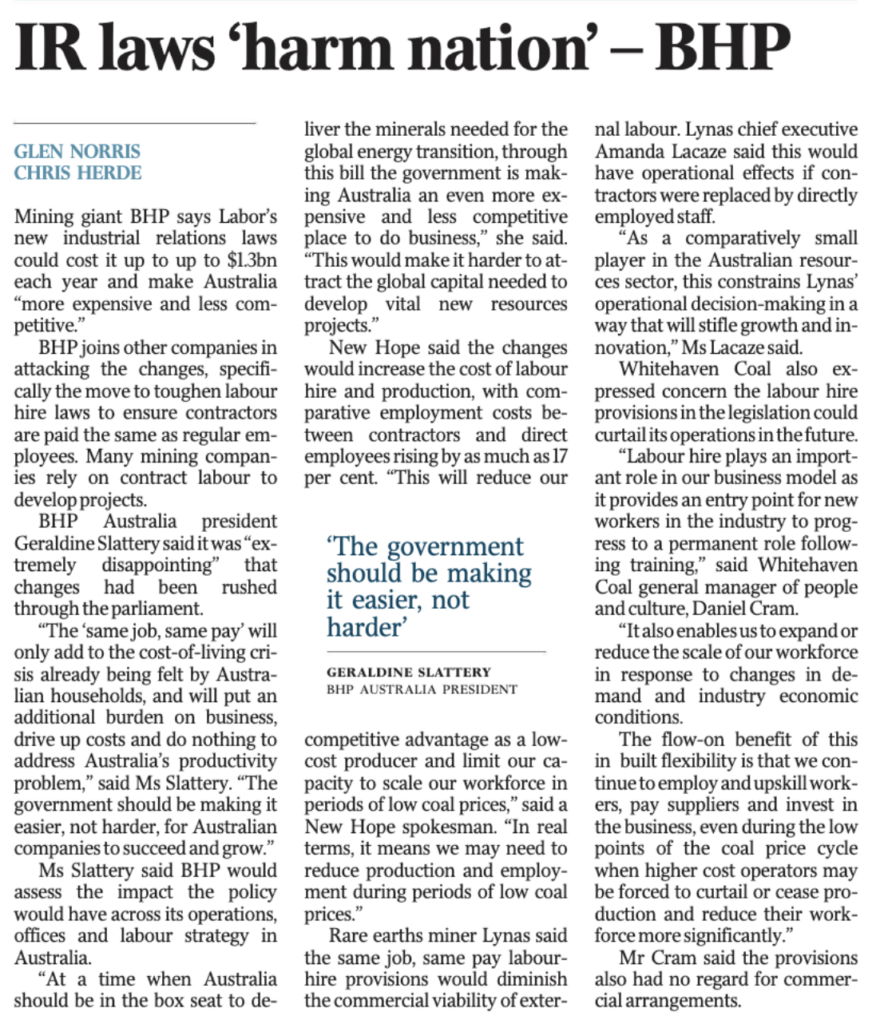

Article by Chris Herde courtesy of the Australian.
Mining giant BHP says Labor’s new industrial relations laws could cost it up to up to $1.3bn each year and make Australia “more expensive and less competitive.”
BHP joins other companies in attacking the changes, specifically the move to toughen labour hire laws to ensure contractors are paid the same as regular employees.
Many mining companies rely on contract labour to develop projects. BHP Australia president Geraldine Slattery said it was “extremely disappointing” that changes had been rushed through the parliament.
“The ‘same job, same pay’ will only add to the cost-of-living crisis already being felt by Australian households, and will put an additional burden on business, drive up costs and do nothing to address Australia’s productivity problem,” said Ms Slattery.
“The government should be making it easier, not harder, for Australian companies to succeed and grow.” Ms Slattery said BHP would assess the impact the policy would have across its operations, offices and labour strategy in Australia.
“At a time when Australia should be in the box seat to deliver the minerals needed for the global energy transition, through this bill the government is making Australia an even more expensive and less competitive place to do business,” she said. “This would make it harder to attract the global capital needed to develop vital new resources projects.”
New Hope said the changes would increase the cost of labour hire and production, with comparative employment costs between contractors and direct employees rising by as much as 17 per cent.
“This will reduce our competitive advantage as a low-cost producer and limit our capacity to scale our workforce in periods of low coal prices,” said a New Hope spokesman.
“In real terms, it means we may need to reduce production and employment during periods of low coal prices.” Rare earths miner Lynas said the same job, same pay labour-hire provisions would diminish the commercial viability of external labour.
Lynas chief executive Amanda Lacaze said this would have operational effects if contractors were replaced by directly employed staff.
“As a comparatively small player in the Australian resources sector, this constrains Lynas’ operational decision-making in a way that will stifle growth and innovation,” Ms Lacaze said.
Whitehaven Coal also expressed concern the labour-hire provisions in the legislation could curtail its operations in the future.
“Labour hire plays an important role in our business model as it provides an entry point for new workers in the industry to progress to a permanent role following training,” said Whitehaven Coal general manager of people and culture, Daniel Cram.
“It also enables us to expand or reduce the scale of our workforce in response to changes in demand and industry economic conditions.
The flow-on benefit of this in‐built flexibility is that we continue to employ and upskill workers, pay suppliers and invest in the business, even during the low points of the coal price cycle when higher cost operators may be forced to curtail or cease production and reduce their workforce more significantly.” Mr Cram said the provisions also had no regard for commercial arrangements.